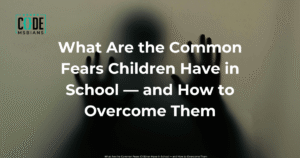Student sleep in class is not uncommon. Students falling asleep in class, struggling to stay awake during lessons, or yawning frequently in common nowadays.
While it may seem like laziness or lack of interest, the real cause is often deeper and biological.
Sleep deprivation in students is a growing problem that affects learning, memory, behavior, and even health.
In this blog, we’ll explore the science behind sleep, why students fall asleep in class, and how quality rest can transform academic performance and emotional well-being.
😴What causes students to doze off during lessons? It’s becoming more common for students to doze off during morning lectures.
But why does this happen?
1. Spending time on screens till late at night Most students stay awake scrolling on their phones, watching videos, or playing games. The blue light emitted from screens delays the production of melatonin, the hormone responsible for sleep
. 2. Overloaded schedules Long school hours, homework, coaching classes, and extracurricular activities often leave students with little time to rest.
Àà3. Biological sleep patterns
Teenagers experience a natural shift in their internal clocks during adolescence, making it difficult for them to fall asleep quickly — even if they are tired.
4. Poor sleep habits
Irregular bedtime routines, caffeine consumption, or a noisy environment can disrupt the ability to fall asleep quickly, restful sleep.
🧠 How poor sleep affects learning and performance
Lack of proper sleep harms students more than just making them feel tired.
🌀 1. Decreased attention and focus
Students who don’t get enough sleep have difficulty concentrating, following instructions, or staying engaged in class. This leads to lower productivity.
🧠 2. Weak memory
Sleep plays a vital role in strengthening memory. Students who are sleep deprived may forget what they learned the previous day.
😔 3. Emotional imbalance
Sleep affects mood and behavior. Tired students are often irritable, tense, or anxious, making it difficult to interact in class.
📉 4. Poor academic outcomes
Repeated sleep deprivation directly affects grades, participation, and even test performance.
🧬 The science behind sleep and learning
Sleep isn’t just rest — it’s brain maintenance.
During sleep, especially during the deep and REM (rapid eye movement) stages:
The brain processes and stores information learned during the day.
It clears out toxins that build up from daily activity.
It strengthens neural pathways that help with problem-solving and decision-making.
This is why students who sleep through the night often perform better in studies than those who stay up until midnight.
🕐 How much sleep do students really need? Health experts suggest the following:
Children (6-12 years): 9-12 hours per night
Teens (13-18 years): 8-10 hours per night
Unfortunately, studies show that most students barely get 6-7 hours of sleep, especially on school nights. Making up for sleep on weekends is not enough to make up for long-term sleep loss.
⚠️ Signs that a student is sleep deprived
Parents and teachers should pay attention to warning signs such as:
Constant yawning or blinking during lessons
Lack of attention or forgetfulness
Mood swings or irritability
Increased cravings for caffeine or sugar
Constant complaints of headaches or fatigue
If a student falls asleep frequently in class, it’s a clear sign that his or her body isn’t getting the rest it needs.
🌙 Tips to improve sleep habits in students
1. Maintain a consistent sleep schedule
Maintain a consistent sleep-wake schedule daily, including weekends. This resets the body’s internal clock.
2. Avoid screens before bed
Turn off all gadgets at least an hour before bedtime. Encourage reading or journaling instead.
3. Create a relaxing bedtime routine
A warm bath or gentle stretching can signal to the body that it’s time to relax.
4. Limit sugar and caffeine intake
Avoid chocolate, colas and energy drinks in the evening.
5. Keep the bedroom sleep-friendly
Your bedroom should be quiet, dark, cool, and distraction-free for better sleep.
👨👩👧 The role of parents and schools in promoting better sleep
For parents:
Educate children about the benefits of sleep on memory and health.
Set boundaries for bedtime and screen time.
Skip heavy meals and stimulating actions before going to bed.
For schools:
Avoid scheduling early morning classes for teens.
Reduce unnecessary academic pressure.
Initiate workshops on sleep hygiene and wellness.
Sleep should be considered an essential part of education—not an optional luxury.
✅ Conclusion
The issue of student sleep in the classroom is more than a distraction in the classroom—it’s a warning sign.
When students don’t get enough sleep, their academic performance, mental health, and personal development suffer.
Teachers and parents must work together to create an environment that respects a child’s biological needs. With better sleep habits, students can improve memory, focus, and become more confident learners.
👉 Remember: A well-rested student is a smarter, happier, and more successful student. Make sleep a priority—because the brain develops best when it’s rested.




